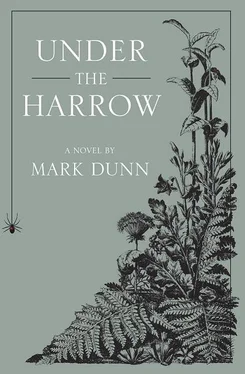My dear Gus:
Nearly a week has passed and you have sent no word to me of how you are getting on in my absence. Do you not miss me even a little? Camilla has been quite a dear and has worked so very hard to improve my spirits, but your absence makes the task so much the harder for her. I do miss you, my dear, and though we quarrel and though I spend my days in bed or in tears (or both) I do not think, as we prepare ourselves to live the rest of our lives without our blessed Newman, that I am strong enough to live without you as well. Please come to Hungerford and see me. It is a pleasant place and Camilla is a good cook — much better than I am. You and I will repair what is broken between us and we will weather this together, as loving husband and loving wife. You will see.
With all my heart,
Charlotte
My brother had done a clever thing, you see. He had led everyone, including his own younger brother Frederick, to believe that he was in Hungerford with Charlotte and her childhood friend Camilla Snigsworth. At the same time he had led Charlotte and Camilla to believe that he was abiding in Fingerpost. But there was no sign that he had ever set foot in his own house the whole week that had passed since Charlotte’s departure. Perhaps he was hiding himself away in Tavistock or Folkstone (though he was not well enough acquainted with anyone in those villages to sponge a visit there), or had joined miners in Blackheath or the Scadger apricot pickers for that matter, but I did not believe it. My gut told me exactly where he was, and the reality of it sickened and frightened me. Gus had gone into the Outland to seek his son. He had more than likely commenced the trip only a few hours after I had tried to talk him out of such a suicidal mission. As always, my brother had followed the dictates of his heart over the wisdom of his head and had turned a deaf ear to every good reason offered against that which he had stubbornly set his mind to do. I hated him at that moment for his foolhardy, headlong impetuosity. I hated him for effectively removing himself from my life, from the life of his wife who was clinging to this broken marriage by her fingertips. But hatred for one you love never lasts. Shortly thereafter my animosity toward my brother — a brother I feared I would never see again — was replaced by a deep, crippling sadness. I sat down upon a bench in my brother and sister-in-law’s front garden, the missive crumpled in my hand, and I bowed my head and wept.
All of that day was spent in a great quandary over what to do about Gus. I was inclined one moment to go after him, and the next to see dangerous folly in such course of action. Mrs. Lumbey and Hannah Pupker and even Mrs. Lumbey’s customarily unmeddlesome dressmaking assistant Miss Casby forbade my venturing out of the valley using the very same reasoning that I had used to argue against my brother’s leave-taking. It was the same case that Gus, no doubt, had made to his young son through his customary offices of parental inculcation, which had not been heeded. Therefore, the question was whether I should follow in the steps of my nephew and brother, or put an end to the lethal family pattern once and all.
“If you go, Frederick, you will break my heart,” said Mrs. Lumbey. “I have lost my only daughter and as I have come to regard you as something of a son, I will die of devastation to see a second child depart from me forever.”
An unsimilar but equally strongly worded proscription was delivered by my friend Antonia Bocker. It would have been seconded by Muntle, had he not been off to the Chowser School to inspect a sudden and most disturbing theft of cabbage sprouts from the Chowser greenhouse, the criminal act having been brought to his attention in an earnest letter from Maggy Finching who felt that a thorough investigation by the sheriff of Dingley Dell (and that officer alone) was in order and the sooner the better.
That afternoon I received the report from Antonia of her visit with a woman by the name of Mrs. Gargery who lived in Park Lane in an old, ivychoked brick residence next to the Pyegrave house. There was a stark contrast of appearance betwixt the two abutting houses; the Pyegrave dwelling, proud and spruce and stone-stolid, seemed almost offended by its close proximity to the aged and mouldering structure that Mrs. Gargery occupied, one of the top story windows of the former being of the eyebrow variety, which made for a comical picture of supercilious judgement upon its neighbour. The Gargery house would have been pulled down long ago had its equally-superannuated owner and occupant not remained stubbornly extant, defying the published actuarial averages by a number of years.
Antonia stood knocking intermittently — knocking and waiting, knocking and waiting — for she knew that Mrs. Gargery had a servant, she knew that Mrs. Gargery must be at home (for the woman hardly ventured out more than once a week), and she knew, further, that Mrs. Gargery could scarcely be called unsociable from this bit of daily behaviour which characterised her: as was her habit, the old woman opened her front door each morning and put herself into a decaying rush-bottomed chair that had been permanently emplanted upon her porch. There she would sit, holding her pug-dog in her lap and making his little paws to wave and salute at passersby when not sharing with her snub-nosed pet a rasher of bacon, the canine nibbling from one end and the ancient hominian nibbling from the opposite end and the two coming together into something resembling a kiss, which was either droll or revolting depending upon one’s opinion of pugs.
Antonia could see the front window curtain drawn slightly back as if there were someone peeping out. “Only persistence will win this day,” she said to herself, determined not to suspend her knocking. In time the door opened and my friend found herself bidding good morning not to the lady of the house, but to the lady’s intermittent companion, Miss Georgianna Milvey, late of the Euphemia Trimmers Memorial Society.
“Good God, Georgianna, has something happened to Mrs. Gargery?”
“Not at all.”
“Then why would no one come to the door? Was that you hiding behind the dimity, wishing that I should go away?”
Georgianna nodded, with nary an ounce of compunction in her address. “I wanted very much for you to go away, Antonia, and that is why I instructed Sarah the housemaid to withhold as well. Mrs. Gargery cannot abide even a small dose of your fiddle-faddle in her present state.”
Georgianna stood in the doorway as if she were an impeding sentry, her arms folded athwart her breast.
“Fiddle-faddle! Good Christ, Georgianna! I’ve come only to put a few delicately-delivered questions to your hostess about the injury and subsequent death of her next-door-neighbour, Mrs. Pyegrave.”
“And I say on behalf of my hostess that she does not wish to speak of that night. She is doing her very best to erase the events of that dreadful evening from every corner of her memory. It will not serve for you to bring it up.”
“I see.” Antonia took a deep breath to steady her nerves, for Miss Milvey, like most of the other members of the Euphemia Trimmers Memorial Society, had a way of setting her teeth on edge. “May I at least step in to bid my friend good morning?”
Georgianna considered the request with wandering ruminative eyes, gave a reluctant nod, and stepped aside to permit entry.
Mrs. Gargery was to be found in her sitting room lounging upon a chaise longue, wearing a tiara and eating a boiled egg. The old woman was partial to breakfast and preferred no meal that did not resemble it, though her partiality to such an unvarying repast should seem monotonous to some. Since she had lived to be quite old and had all the while remained relatively hale, the issue of whether such a limited diet should be in some way injurious to her health had been settled in favour of her odd dietary preference many years before.
Читать дальше












